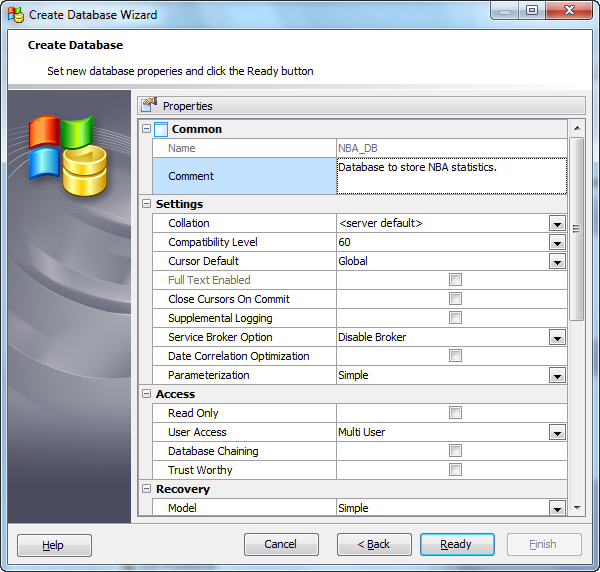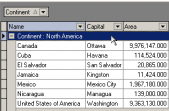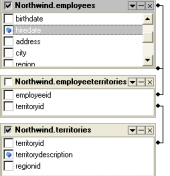MS SQL Maestro online Help
| Prev | Return to chapter overview | Next |
Specifying database properties
The next wizard step allows you to set common database options. All fields below are optional, i.e. it is not obligatory for you to fill them.

Compatibility Level
Sets the version of SQL Server for the database to be compatible with (60 = SQL Server 6.0, 65 = SQL Server 6.5, 70 = SQL Server 7.0, 80 = SQL Server 2000, 90 = SQL Server 2005).
Cursor Default (GLOBAL, LOCAL)
Controls whether cursor scope uses LOCAL or GLOBAL. When LOCAL is specified and a cursor is not defined as GLOBAL when created, the scope of the cursor is local to the batch, the stored procedure, or the trigger in which the cursor was created. The cursor name is valid within this scope only. When GLOBAL is specified and a cursor is not defined as LOCAL when created, the scope of the cursor is global to the connection. The cursor name can be referenced in any stored procedure or a batch executed by the connection.
Full Text Enabled
Enables full text support.
Close Cursors On Commit
If checked, all currently open cursors are closed when a transaction is committed or rolled back. Otherwise, cursors remain open when a transaction is committed; rolling back a transaction closes any cursors except those defined as INSENSITIVE or STATIC.
Read Only
Users can read data from the database but not modify it.
User Access (SINGLE USER, RESTRICTED USER, MULTI USER)
Controls user access to the database. If single user is specified, only one user at a time can access the database. Restricted user allows members of the db_owner fixed database role and dbcreator and sysadmin fixed server roles only to connect to the database, but does not limit their number. If multi user is selected, all users that have the appropriate permissions to connect to the database are allowed.
Torn page detection
The option allows you to enable or disable verifying the database pages to find the corrupted ones. In Microsoft SQL Server 2005 the option is called Page Verify and admits to the following values: Checksum, Torn page detection, None.
Ansi Null Default
Determines the default value, NULL or NOT NULL, of a column or user-defined data type for which the nullability is not explicitly defined in CREATE TABLE or ALTER TABLE statements. If checked, the default value is NULL.
Ansi Nulls
If checked, all comparisons to a null value evaluate to UNKNOWN. Otherwise, comparisons of non-UNICODE values to a null value evaluate to TRUE if both values are NULL.
Ansi Warnings
If checked, errors or warnings are issued when conditions such as divide-by-zero occur or null values appear in aggregate functions.
Recursive Triggers
If checked, recursive firing of AFTER triggers is allowed.
Quoted Identifiers
If checked, double quotation marks can be used to enclose delimited identifiers. Otherwise, identifiers cannot be in quotation marks and must follow all Transact-SQL rules for identifiers. Literals can be delimited by either single or double quotation marks.
Null Concat
If checked, the result of a concatenation operation is NULL when either operand is NULL.
Arithmetic Abort
If checked, a query is ended when an overflow or divide-by-zero error occurs during query execution. Otherwise, a warning message is displayed when one of these errors occurs, but the query, batch, or transaction continues to process as if no error occurred.
Auto Close
If checked, the database is shut down cleanly and its resources are set free after the last user exits.
Auto Create Statistics
If checked, any missing statistics required by a query for optimization are automatically built during query optimization. Otherwise, statistics must be manually created.
Auto Shrink
If checked, the database files are automatically shrunk during periodic checks for unused space.
Auto Update Statistics
If checked, any out-of-date statistics required by a query for optimization are automatically updated during query optimization. Otherwise, statistics must be manually updated.
| Prev | Return to chapter overview | Next |





 Download
Download Buy
Buy
